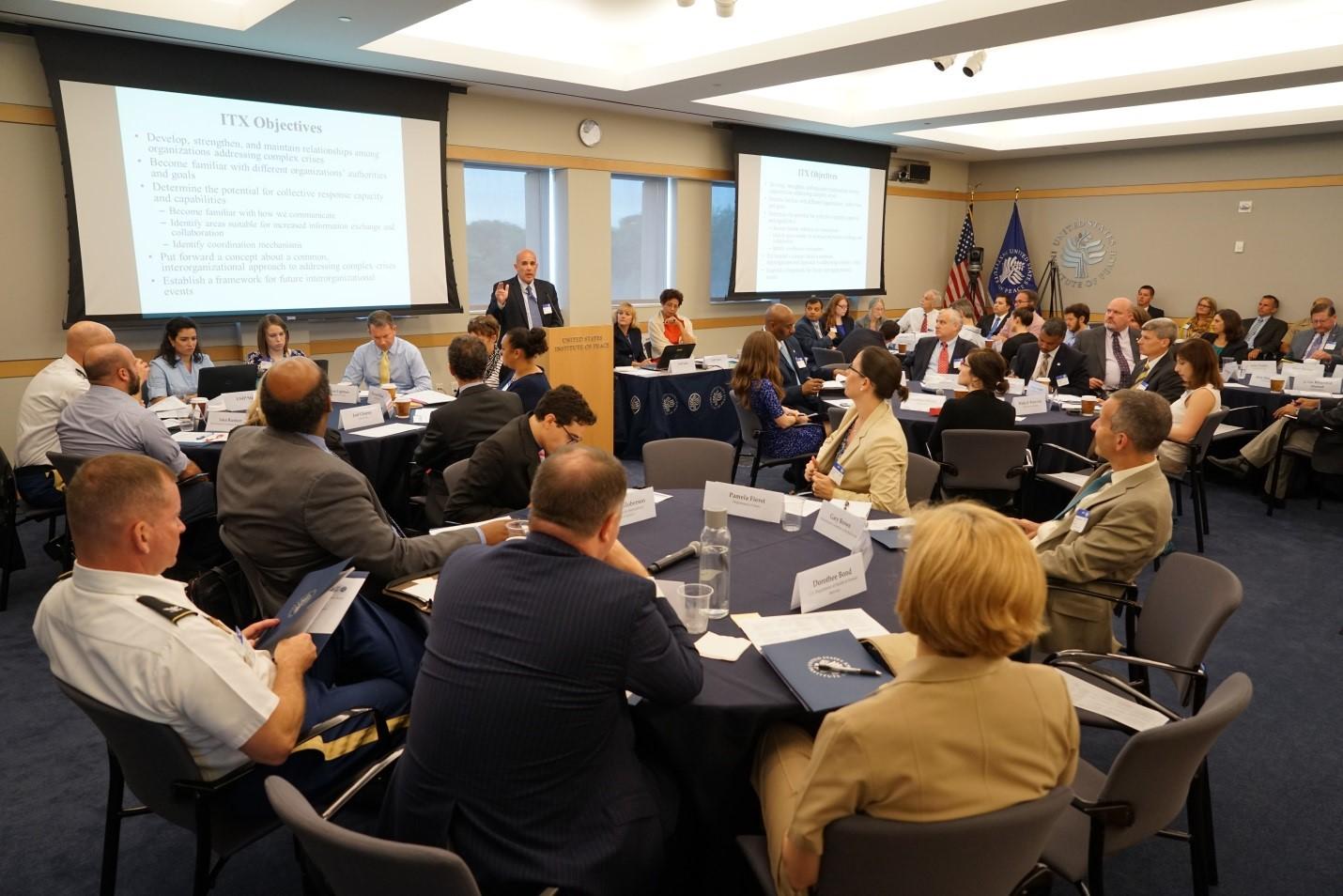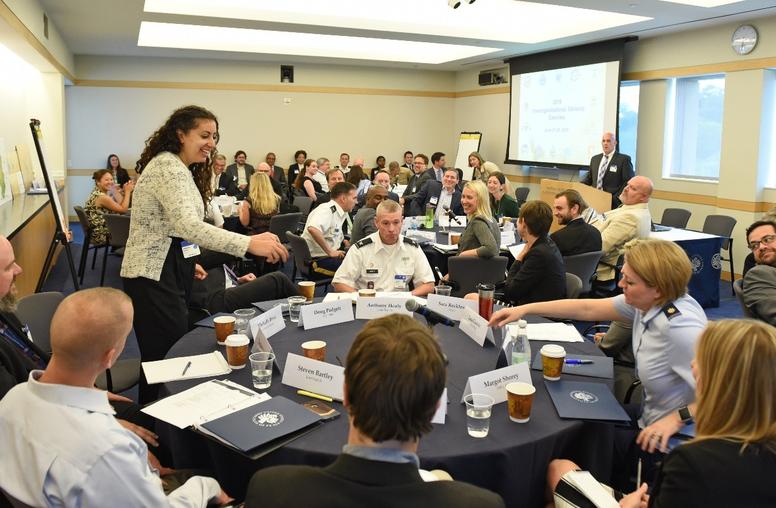The Interorganizational Tabletop Exercise (ITX) is a vehicle by which the civ-mil community can work through a common issue or challenge to better understand different organizational approaches and coordination mechanisms as well as explore opportunities for greater information sharing and joint planning/initiatives to provide more effective assistance. Presentations, facilitated dialogue and exercise scenarios are carefully constructed to facilitate learning that leads to improved effectiveness when these same organizations find themselves sharing the space in a complex environment.

The exercise seeks to produce measurable change and impact for the community of practice. Each ITX addresses a specific theme and geographic area identified as important by all relevant actors. Regardless of the specific ITX theme or region, each ITX is designed to build upon previous ITX progress in improving civilian-military relations.
Unique Design
USIP and the Joint Staff (JS) J7, in collaboration with U.S. government agencies, non-governmental organizations (NGOs)/international organizations (IOs) and a geographic combatant command collectively design and implement a tabletop exercise. USIP engages internal and external stakeholders to identify topics of interest. Initial meetings scope objectives and the exercise format necessary to achieve maximum impact.
In the heavily populated exercise world, the ITX framework offers a number of distinctive features, including ensuring that host nation perspectives are incorporated into the design of the exercise. The ITX utilizes objectives from relevant civilian and military stakeholders as the foundation of the design process to develop and implement an exercise that reflects their priorities—both thematic and geographic. Moreover, it creates an environment in which these diverse actors are given equal voice in the conversation so that all may benefit from the variety of experience and perspective. The discussion topics, findings and learnings from the ITX are then able to inform other educational and exercise opportunities. ITX duration, size, audience, level, follow-up activities, etc. vary by topic and desired outcomes and objectives.
USIP in partnership with the JS J7 has utilized the ITX framework in four previous iterations. Planning is currently underway for our fifth ITX which will take place in 2019 and will address cross-regional dynamics that involve a number of geographic entities and coordinating mechanisms to identify gaps and seek practical recommendations to address them.
2018 ITX
The 2018 ITX focused on preventing and countering violent extremism in the southern Philippines. The siege of Marawi by ISIS-affiliated extremists in 2017 highlighted the long-standing tensions between the Muslim population and the Philippine government. The reconstruction of Marawi and implementation of the Bangsamoro Organic Law (BOL) will inform prospects for peacebuilding.
These events provide opportunities for exercise participants to rethink their assistance, plan for contingencies in consultation with other organizations engaged in the region, and to assess how best to strengthen strategic partnership with the Philippine Government.
Demobilization of insurgents, risk tolerance, reliable and flexible funding were identified as key issues requiring further work to improve the effectiveness of external assistance in this watershed moment.
2017 ITX
The scheduled drawdown of the African Union Mission in Somalia (AMISOM) slated to begin in 2018 was the catalyst for the 2017 ITX. Its overarching theme was “Transitioning from Fragility toward Stabilization and Sustainable Human Security in Somalia and the Region.” Representatives from the Departments of State and Defense, U.S. Agency for International Development and a number of NGOs convened over 3.5 days to assess the impact of AMISOM’s drawdown and eventual withdrawal from Somalia and to plan how best to ease the transition to Somali responsibility for security and governance. An opening day of panels composed of Somalis and experts on Somalia injected a strong host country component to inform subsequent discussions. Recommendations from the exercise centered on how best to support the new Somali government’s priorities were presented to Senior Leaders at the conclusion of the exercise.
2016 ITX
The 2016 ITX focused on countering violent extremism (CVE) in the Lake Chad Basin. The Civ-Mil Relations team collaborated on the design and implementation of the ITX with relevant actors from the Department of State, U.S. Agency for International Development (USAID), the Department of Defense as well as a number of NGOs and IOs.
During the ITX, these organizations wrestled with the uncertainties and ambiguities of CVE to compare understanding, share initiatives, discuss progress and shortcomings and explore the interplay of different CVE efforts to devise practical strategies to work together more effectively.
Translating discussion into action: Issues, challenges and opportunities identified by participants in the 2016 ITX were briefed to senior leaders in the concluding session of the 2016 ITX. They, in turn, tasked participating organizations (and others in the community of interest) to delve more deeply into the issues raised and propose concrete recommendations to address problems or shortcomings in a second senior leaders’ meeting in early 2017. Three interorganizational working groups formed to look at challenges surrounding policy synchronization, analytical CVE frameworks, as well as gaps in current learning and knowledge sharing.
2014 ITX
The 2014 ITX brought together participants from over 15 U.S. government agencies, departments and bureaus as well as a number of NGOs and IOs. Its purpose was to increase understanding, cooperation, and effectiveness among organizations operating in a complex crisis environment by developing and promoting relationship building, mutual trust, and knowledge sharing. Its objectives were to develop, strengthen, and maintain relationships among organizations addressing complex crises; become familiar with different organizations’ authorities and goals; determine the potential for collective response capacity and capabilities; put forward a concept about a common, interorganizational approach to addressing complex crises; and establish a framework for future interorganizational events.
Using South Sudan and Ethiopia as case studies, the participants grappled with the following key interorganizational topics:
- Institutionalizing relationships
- Information sharing mechanisms
- Lines of authority
- Organizational priorities and navigating the response and development divide





